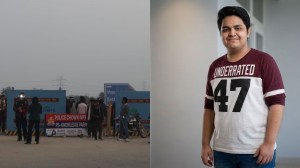Needed: New Iran policy
A real live American is a rare find in Iran these days. At an official 8216;8216;Death to America8217;8217; rally in Tehran last year, a...

A real live American is a rare find in Iran these days. At an official 8216;8216;Death to America8217;8217; rally in Tehran last year, a horde of giggling chador-clad high-school girls asked for my autograph. Like many other Iranians I talked to, during the 18 months I spent working there, they were tired of the regime8217;s rants about the 8216;8216;Great Satan8217;8217; and greeted me like a long-lost cousin.
Despite widespread frustration with the regime8217;s repressive methods and rank hypocrisy, no organised opposition movement or leader has emerged to harness public anger. Iran is not on the verge of revolution. As the prospect of a nuclear-armed Iran looms, the US will have to face that reality.
The US will come to regret its decision to stand by, shaking its head disapprovingly while EU initiatives falter. With Iran cleverly playing off divisions between Europe and America, it has become clear that only a united approach can concentrate minds in Tehran.
Indulging fantasies about toppling the regime or seductive plans for unilateral action are merely excuses for avoiding the hard work required to forge an international consensus.
Iran8217;s clerics would exploit any US go-it-alone response by stirring up national feeling and seeking out sympathetic treatment from other governments. When I was there, I encountered a sense of despair among Iranians and a desire to simply tune out the regime. Street demonstrations have steadily dwindled in size since 1999, when student unrest peaked. The total absence of a mature, coherent Opposition, coupled with raw fear of their leaders, makes Iranians reluctant to risk beatings from paramilitaries for protests that have no clear objective.
| nbsp; |
US backs Powell comments
on Iran nuclear threat |
||||
| nbsp; |
8226; Washington: The US on Fridaydefended its charges that Iran was working to fit a missile with a nuclear warhead and dismissed doubts about the reliability of its intelligence on Tehran. The No. 2 US diplomat suggested Washington8217;s deliberately tough line was part of a strategy that could help Europeans who are negotiating to persuade Iran to suspend some nuclear activities. 8220;We believe we are on very, very solid ground in pointingto a clandestine effort by Iran to develop WMD and their delivery systems,8221; Adam Ereli, a State Department spokesman, said. But European Union foreign policy Chief Javier Solana, a former NATO boss, challenged the US allegations. 8220;At this point, the Iranians do not have any nuclear weapons, so it8217;s impossible to use the missiles with nuclear weapons,8221; he said during a visit to Austria. 8212; Reuters |
nbsp; | |||
In the affluent neighborhoods of north Tehran, foreigners are told that the regime is fading and will collapse with the slightest Western push. Even if revolution seems far away, Islamic militancy has proved a colossal failure. But because there is no Lech Walesa or Nelson Mandela organizing against the theocracy, change will not come soon.
One sure way to derail the cause of democracy would be heavy-handed US action. Iranians retain a deep sense of national pride, and a clumsy covert operation or a stray bomb from the US would be a gift to the mullahs.
Unlike in North Korea, pragmatists within Iran8217;s leadership care about the country8217;s international position and want to avoid universal condemnation and sanctions. They know that European governments distrust the current American administration and want to preserve their commercial interests in the country8217;s oil-rich economy.
The Bush administration wants the issue referred to the UN Security Council. But Iran is gambling that France, Russia and China will oppose any genuine sanctions. Only transatlantic unity provides hope of heading off Iran8217;s secretive nuke experiments. That will require the US to start speaking directly to Iran, without concessions or conditions, in the same direct way we spoke to the Soviets during the Cold War. 8212; LAT-WP
- 01
- 02
- 03
- 04
- 05































